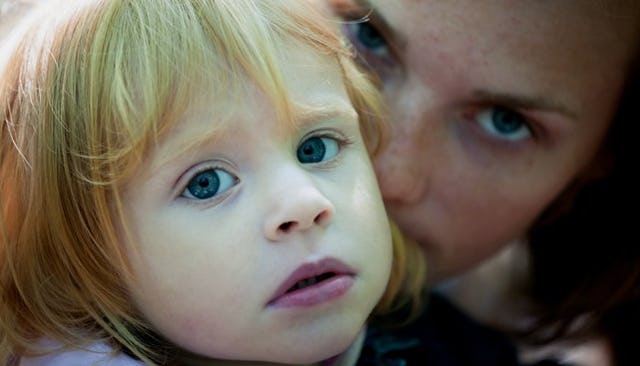The Truth About Being A Mom With A Speech-Delayed Child

When you have a speech delayed child, many people blow it off as being no big deal. No, it’s not the end of the world and yes, kids develop at different rates — but to you and your child, it is a big deal. You put on a happy face, try to ignore the dismissive comments, and hide how you really feel. There is so much you really want to say. Maybe it’s time you do.
It hurts just to get those child development emails about your child’s current stage. Start learning French? She doesn’t even speak much English. Saying shapes and colors? She doesn’t even say “dog.” This e-mail isn’t about your child’s development, and it hurts to keep being reminded of that.
It hurts to hear all those stories about how other kids someone knows started talking late. You don’t want your child to be behind. You don’t know if your child will get picked on or mocked for not talking. Kids are cruel; they already notice at the park that she doesn’t talk and point it out. They call her a baby. You don’t know if your child is hurt by it, too — she can’t even tell you.
It hurts in the store when strangers ask her a question, get no response or just babble, so give you the, “WTF?!” look. It hurts even more when your child tries so hard to talk to them, just to be ignored or told, “I have no idea what you’re saying. You make no sense. HOW old are you? It’s rude not to answer.” You know she’s trying so hard and these rude people just dismiss her efforts. It’s just plain annoying when people keeping saying, “Can you say, ‘xx’?” No, she can’t. That’s also not the way to encourage a speech delayed child. You’re just too polite to tell the idiot to STFU.
It hurts to constantly have to explain why she doesn’t talk. You feel like you’re betraying your child somehow when you do — yet you don’t want them to think she’s just being rude or doesn’t understand them either.
It hurts when people assume your child is stupid or doesn’t understand what’s being said, just because she isn’t talking. She understands. She understands so, so much.
It hurts reading those bragging Facebook posts from a mom with kids who are the same age — or younger — about how her kid knows shapes, colors, ABCs, said something so cute, or is speaking in sentences. You feel bad being hurt by it, too, as you’re glad their child is doing well. The worst? The posts where so-and-so says their toddler said, “I love you.” You want to hear it oh-so-badly and don’t know when (or if) you ever will.
It hurts to have people keep suggesting you should get her help. Really, it’s aggravating. You’re doing everything you can, have spoken to the doctor, have in-home therapists, even started therapy early. Do people really think you wouldn’t bother to get your kid the proper help? Go stuff it, lady. And to the people who think they know more than the specialists, just because they’re older, had kids, or are a grandmother? They can stuff it, too.
It hurts and is frustrating having a child who is speech delayed. It also hurts to admit that because you feel horrible saying it. No mom wants her child to be behind or suffer. Every mom questions if it was something she did wrong, or didn’t do, when her child has any issue. The self-blame is strong. Admit that it hurts and is frustrating, though, and whoever you tell will be all over you in a second, telling you, “Do you even love your child? Maybe you shouldn’t have had children, you know it just gets harder. Maybe you should give your child up for adoption if you think it’s hard. You’re just belittling her and insulting her by saying she has issues.” Really? Seriously? That crap isn’t even worth answering and is one of the major reasons you have to hide all you feel.
It hurts to be told not to worry about the speech delay. That’s easy for someone to say who hasn’t gone through it, or whose kid advanced with therapy and was done with it almost before they started. Your child still struggles.
It hurts to see your child struggle. It’s a helpless, frustrating feeling to see what she’s going through and to not be able to make it all better.
It hurts to know your child is hurting, but not even be able to tell you. You still see her face fall when people blow her off and walk away, call her a baby, or point out that she isn’t talking or isn’t easily understood with the few words she does say.
It hurts not being able to communicate with your child, who can’t tell you what she thinks, feels, wants, needs — when she should be able to.
It hurts being afraid. So afraid. Why has she made no progress with therapy? Will she improve? Will she be caught up by the time she goes to school? Will other issues show up? Are you just being stupid and worrying over nothing? Will your other child have the same issues?
The short and simple truth is it hurts. It hurts so much, in so many ways, and few truly understand.
This article was originally published on